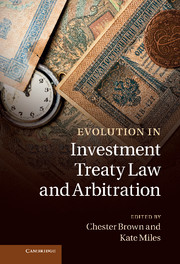Book contents
- Frontmatter
- Contents
- Contributors
- Editors' preface and acknowledgements
- Table of cases
- Table of Treaties
- Part I Introduction
- Part II Shifts in fundamental character
- Part III Actors in international investment law
- Part IV The new significance of procedure
- 15 The new rules on participation of non-disputing parties in ICSID arbitration: Blessing or curse?
- 16 The role of procedure in the development of investment law: The case of Section B of Chapter 11 of NAFTA
- 17 Navigating the parallel universe of investor–State arbitrations under the UNCITRAL Rules
- 18 The scope of ‘amount of compensation’ dispute-resolution clauses in investment treaties
- 19 Interference by a local court and a failure to enforce: Actionable under a bilateral investment treaty?
- 20 Bias challenges in investor–State arbitration: Lessons from international commercial arbitration
- Part V Engagement with cross-cutting issues
- Part VI Conclusions
- Index
- References
15 - The new rules on participation of non-disputing parties in ICSID arbitration: Blessing or curse?
from Part IV - The new significance of procedure
Published online by Cambridge University Press: 05 December 2011
- Frontmatter
- Contents
- Contributors
- Editors' preface and acknowledgements
- Table of cases
- Table of Treaties
- Part I Introduction
- Part II Shifts in fundamental character
- Part III Actors in international investment law
- Part IV The new significance of procedure
- 15 The new rules on participation of non-disputing parties in ICSID arbitration: Blessing or curse?
- 16 The role of procedure in the development of investment law: The case of Section B of Chapter 11 of NAFTA
- 17 Navigating the parallel universe of investor–State arbitrations under the UNCITRAL Rules
- 18 The scope of ‘amount of compensation’ dispute-resolution clauses in investment treaties
- 19 Interference by a local court and a failure to enforce: Actionable under a bilateral investment treaty?
- 20 Bias challenges in investor–State arbitration: Lessons from international commercial arbitration
- Part V Engagement with cross-cutting issues
- Part VI Conclusions
- Index
- References
Summary
Introduction
Over the last fifteen years, various substantive matters that have arisen in investor–State arbitration have attracted significant controversy. Recently, however, there has also been an increasing focus on procedural issues. Of particular note were the procedural changes introduced in 2006 by the International Centre for Settlement of Investment Disputes (ICSID). The ICSID amended its arbitration rules which now, inter alia, include an express provision allowing for non-disputing parties to make written submissions to investment tribunals (Rule 37(2)), an option that was not expressly provided for previously. This chapter will take stock of the first few years since the adoption of this new rule and examine the impact of this particular amendment on the conduct of proceedings. In what way has this new possibility affected the disputing parties and the conduct of the arbitral process? How frequently has this option even been used in practice? Do written submissions of non-disputing parties have an influence on the decision-making process and the findings of arbitral tribunals? How can this increased transparency during the proceedings be reconciled with the necessity to provide for confidentiality of sensitive information?
In answering these questions, this chapter will examine recent cases where this new provision has become applicable, starting with Biwater Gauff (Tanzania) Ltd v. Tanzania, the first case where a number of non-governmental organisations (NGOs) submitted amicus curiae briefs to the tribunal on the basis of the new Rule 37(2). Interestingly, however, it is not just NGOs that have made use of this option. Recently, the European Commission has also discovered this procedural tool, enabling its participation in investment arbitrations that have been instituted against new EU members. In these cases, investors have initiated arbitration against countries such as Romania and Hungary alleging violations of certain provisions of bilateral investment treaties (BITs) or the Energy Charter Treaty (ECT). In these particular circumstances, an additional layer of controversy arises from the potential conflict between obligations under BITs and obligations under EU law. On account of this possible conflict, the European Commission, the ‘Guardian of the Treaties’, possesses a vested interest in becoming involved in such arbitrations. However, participation of this nature necessarily generates still further questions – how much influence can or should a highly influential political institution such as the European Commission exercise on investment tribunals? Is this a positive development or does increased participation of potent non-disputing parties cause more harm to the system of investment arbitration than it creates benefits? This chapter will explore these issues. It will assess the relevance of non-disputing party participation in arbitral practice thus far and weigh the benefits of this new option against any potential risks posed by this new mechanism.
- Type
- Chapter
- Information
- Evolution in Investment Treaty Law and Arbitration , pp. 319 - 338Publisher: Cambridge University PressPrint publication year: 2011
References
- 1
- Cited by



